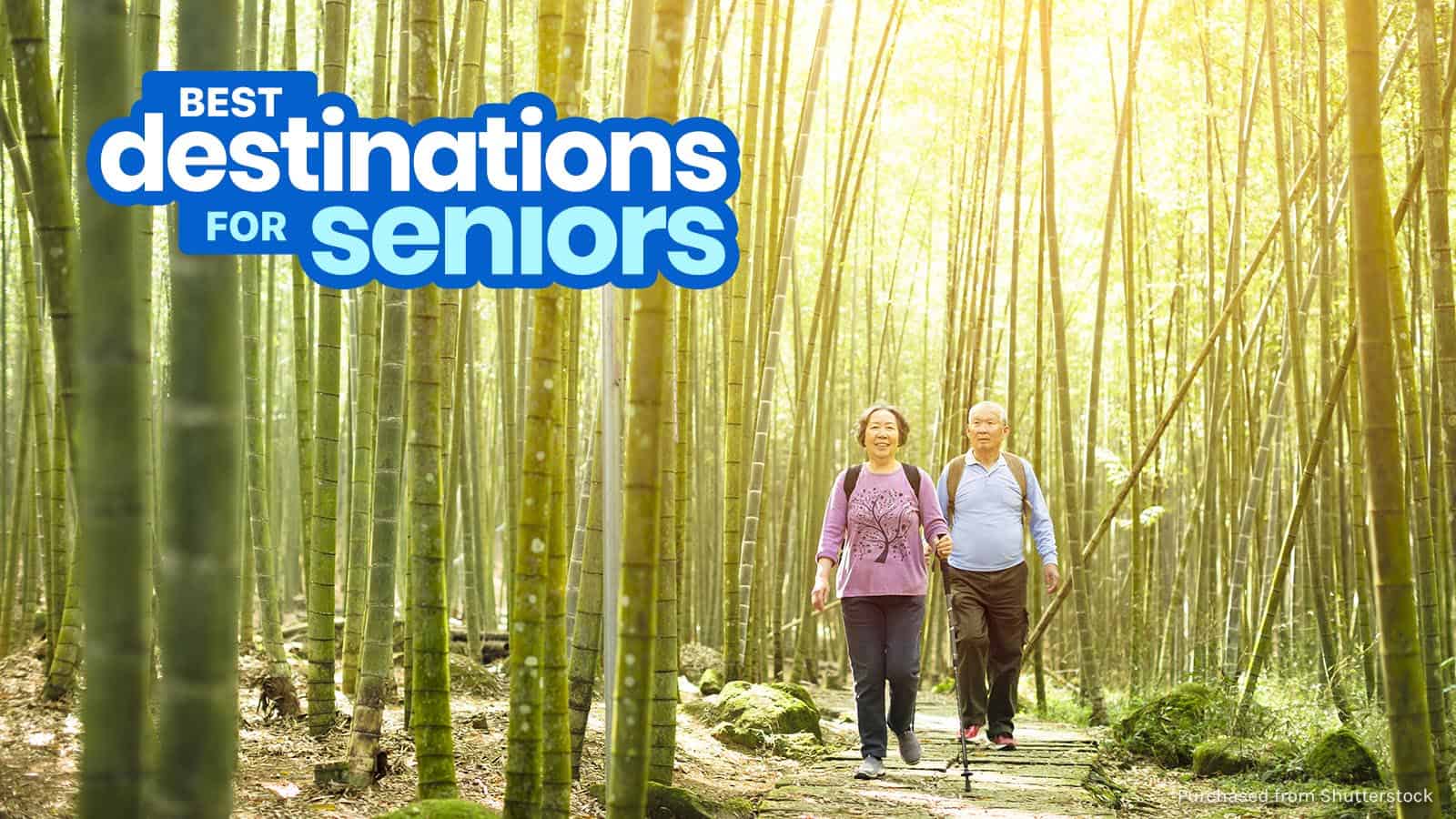Elderly travel tours represent a burgeoning sector within the tourism industry, catering to the unique needs and desires of a growing demographic. This guide delves into the market analysis, tour features, and marketing strategies crucial for success in this specialized niche. We will explore the specific considerations for designing accessible and engaging travel experiences for older adults, addressing physical limitations, health concerns, and technological preferences. Understanding the preferences and needs of this demographic is key to creating truly memorable and enriching travel experiences.
From accessible transportation and tailored itineraries to specialized services and effective marketing strategies, we will examine the multifaceted aspects of creating successful elderly travel tours. We will also discuss the integration of technology to enhance the overall travel experience, focusing on user-friendly platforms and resources that cater to the needs of older travelers. The goal is to provide a practical and insightful overview for anyone interested in understanding or participating in this rewarding sector of the travel industry.
Tour Features and Services for Elderly Travelers
Our tours are meticulously designed to cater to the specific needs and preferences of senior travelers, ensuring a comfortable, enjoyable, and safe experience. We understand that the travel experience for older adults requires careful consideration of physical capabilities, health concerns, and a desire for a relaxed pace. This commitment to accessibility and personalized service sets our tours apart.
The key to successful senior travel lies in anticipating and addressing potential challenges proactively. This involves offering a range of supportive services and features that enhance comfort and peace of mind, allowing our guests to fully immerse themselves in the travel experience without unnecessary stress or worry.
Accessible Transportation and Pacing
Our tours utilize transportation specifically designed for accessibility. This includes vehicles with ramps or lifts for wheelchairs and other mobility devices, wider aisles for easier movement, and ample space for luggage and personal items. We also strategically plan itineraries to avoid excessive walking or strenuous activities. Rest stops and opportunities for relaxation are incorporated throughout the day, allowing ample time for rejuvenation. For example, a typical day might include a morning visit to a historical site with a leisurely pace, followed by a relaxed lunch and an afternoon at a scenic location with opportunities to sit and enjoy the view. The overall pace is designed to be gentle and enjoyable, allowing participants to fully appreciate the experience without feeling rushed or overwhelmed.
Specialized Services for Enhanced Comfort
We recognize that many elderly travelers appreciate assistance with various aspects of their trip. Therefore, we provide a comprehensive range of specialized services. This includes assistance with luggage handling, both at airports and hotels, ensuring a smooth and stress-free transition. Dietary accommodations are readily available, catering to specific dietary needs and restrictions, such as low-sodium diets, diabetic-friendly meals, or allergies. We work closely with hotels and restaurants to ensure these needs are met. Furthermore, we offer medication management assistance, helping travelers organize and track their medications throughout the trip. This can be particularly beneficial for individuals managing multiple medications or complex regimens. Our dedicated staff is trained to provide discreet and respectful support in this area.
Sample Seven-Day European River Cruise Itinerary
This itinerary exemplifies our commitment to accessible and inclusive travel for senior citizens.
Day 1: Arrival in Amsterdam, transfer to accessible river cruise ship, welcome reception with light refreshments.
Day 2: Guided tour of Amsterdam’s canals and historical sites, using accessible transportation and allowing for frequent rest stops.
Day 3: Scenic cruise through the Dutch countryside, with opportunities for leisurely walks on accessible paths and onboard relaxation.
Day 4: Visit to Cologne, Germany, with accessible transportation to major attractions and gentle walking routes.
Day 5: Rhine River cruise, enjoying onboard amenities and scenic views, with accessible areas for relaxation.
Day 6: Visit to a charming medieval town (e.g., Rüdesheim), featuring accessible shops and restaurants, and gentle exploration.
Day 7: Disembarkation in Amsterdam, transfer to airport, departure.
Marketing Materials for Elderly Travelers
Effective marketing materials are crucial for attracting senior travelers. We focus on highlighting the aspects of our tours that are most appealing to this demographic.
- Brochures: Feature large, clear fonts, high-quality photographs showcasing accessible features and relaxed environments, and detailed descriptions of services and itineraries emphasizing ease and comfort. A calming color palette and uncluttered design are essential. Testimonials from previous senior travelers add credibility and build trust.
- Website Descriptions: Emphasize accessible features, such as wheelchair-accessible rooms, elevators, and ramps. Clearly state the pace of the tour and highlight the inclusion of rest stops and relaxation opportunities. Provide detailed information on dietary accommodations and medication management support. Use clear and concise language, avoiding jargon or overly technical terms. Include high-resolution images of accessible facilities and scenic locations.
Technology and Elderly Travel Tours
Technology plays an increasingly vital role in enhancing the travel experience for seniors, offering convenience, safety, and peace of mind. By thoughtfully integrating digital tools, tour operators can cater to the specific needs and preferences of this demographic, making travel more accessible and enjoyable.
The strategic use of technology can significantly improve various aspects of elderly travel, from pre-trip planning to on-the-ground assistance. This includes leveraging mobile applications, online booking systems, and virtual tour previews to create a seamless and worry-free journey.
Mobile Applications and GPS Tracking for Enhanced Safety and Convenience
Mobile applications offer a range of benefits for elderly travelers. GPS tracking features, for example, provide peace of mind for both the traveler and their family. Apps can also offer real-time translation services, access to local emergency contacts, and easy navigation capabilities, minimizing the stress often associated with unfamiliar environments. Features like medication reminders and integrated health information can further enhance the safety and well-being of senior travelers. For instance, an app could allow a caregiver to remotely check on a traveler’s location and well-being, providing reassurance and timely intervention if needed.
Benefits of Online Booking Platforms and Virtual Tour Previews
Online booking platforms offer a convenient and efficient way for elderly travelers to plan their trips. They can compare prices, read reviews, and book flights, accommodations, and tours from the comfort of their homes, eliminating the need for potentially overwhelming in-person interactions. Virtual tour previews allow potential travelers to explore destinations before committing to a trip, reducing anxiety and increasing confidence in their travel choices. For example, a 360° virtual tour of a hotel room can alleviate concerns about accessibility and comfort before booking.
Challenges in Technology Adoption Among Elderly Travelers
While technology offers significant advantages, some elderly travelers may face challenges in adopting and using these tools. These challenges include a lack of familiarity with technology, limited digital literacy, and concerns about security and privacy. Physical limitations, such as vision or dexterity issues, can also pose obstacles. For instance, small screens and complex interfaces can be difficult to navigate for individuals with vision impairment.
Creating User-Friendly Digital Resources for Elderly Travelers
To address these challenges, tour operators should prioritize the creation of user-friendly digital resources. This involves:
- Designing websites and apps with large, clear fonts and high contrast colors.
- Offering comprehensive tutorials and support, perhaps through video guides or phone assistance.
- Simplifying navigation and interface design to minimize cognitive load.
- Providing options for alternative input methods, such as voice commands.
- Prioritizing clear and concise information, avoiding technical jargon.
- Offering multilingual support to cater to diverse traveler needs.
Competitive Landscape and Future Trends
The elderly travel market is a dynamic and growing sector, attracting significant investment and innovation. Understanding the competitive landscape and anticipating future trends is crucial for tour operators seeking success in this niche. This section will examine the key players, their competitive advantages and disadvantages, emerging trends, and potential future developments within the elderly travel sector.
Major Players in the Elderly Travel Market
Several large travel companies, along with specialized niche operators, dominate the elderly travel market. These range from established international brands offering inclusive packages to smaller, boutique companies focusing on specific interests or destinations catering exclusively to senior travelers. Examples include large companies with dedicated senior travel divisions, smaller, specialized operators focusing on accessible travel, and cruise lines with programs designed for older adults. The competitive landscape is diverse, reflecting the varied needs and preferences within this demographic.
Competitive Advantages and Disadvantages of Tour Operators
The competitive advantages of tour operators often hinge on their specialization and unique selling propositions (USPs). For example, companies specializing in accessible travel boast expertise in navigating logistical challenges and providing tailored support. Conversely, disadvantages might include a limited geographic reach or a higher price point compared to more general travel providers. Large companies might offer extensive resources and brand recognition, but could lack the personalized service of smaller operators. Smaller companies might offer a more personalized experience but may have limited resources for marketing or destination expertise.
Emerging Trends in the Elderly Travel Market
The elderly travel market is experiencing significant shifts. Multigenerational travel is increasingly popular, with families choosing destinations and activities suitable for all ages. This trend reflects changing family dynamics and a desire for shared experiences. Sustainable tourism is another growing trend, with seniors showing a strong interest in eco-friendly travel options and responsible tourism practices. This is driven by an increasing awareness of environmental issues and a desire to minimize their impact. Additionally, the demand for wellness-focused travel is increasing, with many seniors seeking tours that incorporate activities promoting physical and mental well-being.
Potential Future Developments and Innovations in Elderly Travel Tours
Technological advancements are poised to revolutionize elderly travel. Virtual reality (VR) technology could offer immersive previews of destinations, allowing seniors to explore potential travel options from the comfort of their homes. Artificial intelligence (AI) could be used to personalize itineraries and provide real-time support, addressing specific needs and preferences. The integration of telehealth services into travel packages could also become more common, ensuring access to medical care while traveling. For example, a tour operator could partner with a telehealth provider to offer remote consultations and medication management to travelers. Furthermore, the development of more accessible transportation options and improved infrastructure in popular destinations will further facilitate elderly travel.
Final Thoughts
In conclusion, the elderly travel tour market presents significant opportunities for growth and innovation. By understanding the specific needs and preferences of older travelers, tour operators can create enriching and memorable experiences that cater to their unique requirements. The integration of technology, thoughtful itinerary planning, and effective marketing strategies are all key to success in this increasingly important sector. Ultimately, the focus should remain on creating safe, comfortable, and engaging travel experiences that allow older adults to explore the world and create lasting memories.




